- From Faith Current: “The Sacred Ordinary: St. Peter’s Church Hall” - May 1, 2023
- A brief (?) hiatus - April 22, 2023
- Something Happened - March 6, 2023
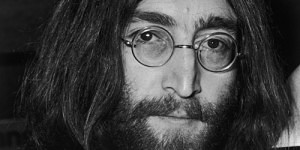
The happy newlywed?
Shirley Tilloch over at Beatles Til I Die has written a very interesting post originally inspired by one over here at Dullblog. This post of mine began as a lengthy comment to her post…until I got to the point where it was too long and went off in too many directions. So apologies in advance if what I’m about to say is a bit (or a lot) scattered. I think it’s sufficiently original to be worth saying anyway.
Briefly—and Shirley, please correct me in the comments if I mischaracterize you—Shirley writes that the presence of a 1969 memo by George asking the other three not to break up the group changes her perception of the whole breakup period. I share Shirley’s surprise, and that’s why I drew attention to the auction in the first place. (For those of you who haven’t read the memo, gardener George writes, “A flower on its own is pretty; a flower in a garden is beautiful.”)
A Flower in a Garden is Beautiful
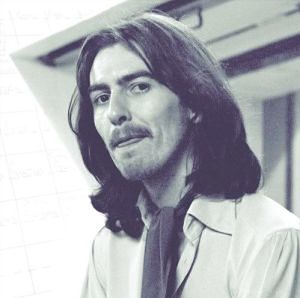
George, giving the world a sidelong glance, 1969
In the conventional narrative, it’s George who wants out of the group most badly—”I won’t play if it pleases you”—the person most annoyed by the group’s fame, and the party most injured by “the Lennon-McCartney carve-up.” In forty years of debate, from “Yoko did it” to “we all got married,” Harrison’s negative stance on late-period Beatles has never been questioned, and is consistent throughout The Beatles Anthology, as well.
In an effort to put the memo into proper context, Shirley looked at what George was doing between September 1969 (when Lennon secretly announced that he was leaving the group) and April 1970, when McCartney made his public announcement. Here’s what Shirley found:
The very first item I came across was that on 2nd December 1969 [George] took to the stage for the first time since The Beatles played their last ever official concert at Candlestick Park in August 1966, forming part of the backing group for Delaney & Bonnie (alongside his good friend Eric Clapton). George ended up doing 6 consecutive gigs with them (the pic at the top of this page is taken from a gig in Denmark after these 6 UK dates), staying in local hotels along the way, very much like the package tours the Beatles played on from 1963-65.
Okay, George certainly wasn’t the only Beatle striking out on his own during this time, but I just can’t reconcile the George of this period, gigging again as part of a large band, as having written that memo.
After thinking about it a bit, Shirley, I can—but I don’t much like the answer.
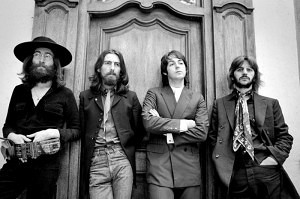
The Moptops, havin’ fun in August 1969.
The Harrison memo is, apart from being prescient about their solo careers, an excellent reminder not to put too much trust in the official story. For example, Shirley writes that, unlike George, she could see Paul writing such a memo, because “outside of Brian Epstein, he was the biggest fan of, and believer in, the Beatles right from the start.”
That is the usual view for a lot of good reasons, not least Paul’s Mr. Showbiz demeanor (which includes snuggling up to his Beatle past on record and in concert). But I recall reading somewhere that (for example) Lennon and Epstein were so much of the same mind about The Beatles—so integral to each other’s thinking and planning for the group—that for all intents and purposes, they represented a single driving force determined to conquer the world. While it’s clear that John had found other pursuits by ’69, I think it’s good to remember just how much of a Beatle backer he had been at other times–and the nostalgia he felt as early as ’75, long before the others shared it.
John Lennon loved The Beatles. He got the same thrill we all get, only infinitely more so—if The Beatles were and are a spirit, John Lennon was the medium, and he knew it. Whenever there was no pressing commercial reason to distance himself from the group, Lennon embraced it. His major anti-Beatle statement, the 1970 screed in Rolling Stone, was designed to sell records, specifically Plastic Ono Band, which was to hard-headed myth-busting what Rubber Soul was to pot. It should be read in that light. (Lennon himself downplayed it; when George Martin confronted him years later over some things he said, Lennon demurred. “You know me, I say whatever pops into my head.”)
The other Beatles had similarly complex relationships with the group. George’s gigging with D&B isn’t necessarily at odds with somebody wanting to keep The Beatles making music. Nobody wanted to go back to 1966, that’s for sure, but otherwise it was totally up to the four guys in the band. One can read George’s actions as “I can have fun working with other musicians, so screw J/P/R”–or perhaps, “Oh! I can work with other musicians without breaking up The Beatles…so why close that door?”
As Shirley alludes, by ’69, every Beatle had released an LP without the others (Family Way, Wonderwall, J&Y’s various). John and George had performed in public with other groups. At least Paul and George had produced other groups, and played on other people’s records. And, with Clapton and Preston, other people were increasingly being let onto Beatle sessions. There was simply no external reason for any split to be permanent. “Paul tried to take over the group” feels very much like a Klein-era legal gambit; I highly doubt that Let It Be Paul was much different in the studio than Sgt. Pepper Paul had been. Then as now it benefits some people financially for the Beatles’ breakup to be seen as inevitable, but that simple story doesn’t really wash, and that’s why it constantly has to be reinforced, re-told.
Lennon broke up the Beatles. He was the only one who could.
So if the conventional story isn’t quite true, why doesn’t the “truth” come out, whatever it is? Because the breakup of the group took place inside John Lennon’s mind. Lennon acted; the others re-acted. However much the other Beatles might’ve changed incrementally from 1966-69, that same period tracks a monumental shift in manner on Lennon’s part. How much of that is due to heavy drug use? How much to Yoko? How much to the overheated rhetoric of the times? After Rishikesh, in Lennon’s mind The Beatles change from refuge and vehicle to threat and hindrance. “Why?” can no longer be answered. But forty years later, some other questions can be resolved.
Was The Beatles a hindrance to Lennon’s political activity?
No — exactly the opposite. Whatever he wanted to accomplish as a spokesman, his bully pulpit was significantly bigger as a Beatle than as a solo star. As an activist, most of what we remember “JohnandYoko” for happened while Lennon was a Beatle. Compare the impact, freshness, and coverage of the “Bed-In” (Beatle period) with “Nutopia” (solo period).
Was the group a hindrance to Lennon creatively, or as a recording artist?
Absolutely not. Even if it had been an either/or choice, which it wasn’t, the quality, breadth, amount and impact of Lennon’s solo work did not match his Beatle days — with the possible exception of Plastic Ono Band and Imagine (some of which dates back to the Beatle era, eg “Jealous Guy”/”Child of Nature”).
Was the pressure and attention of being a Beatle psychologically more difficult?
Once again, the rest of Lennon’s life suggests “no.” From the outside at least, my rather exhaustive (and at times exhausting) reading of Lennon sources reveal that the things that seemed to give Lennon true joy — living in NYC, having a son — had nothing to do with whether or not he was a Beatle. And the things that seemed to really torment him — creative difficulties, a tendency towards paranoia and isolation — had been much more manageable problems during the Beatle years than after. Looked at this way, leaving The Beatles was the worst thing John Lennon ever did to himself…and he was too smart not have realized that.
An irrational act, he couldn’t take back
It’s impossible to make sense of The Beatles’ split as a rational act. It was rational to get off the teenybopper treadmill, and they’d done that. It was rational to record less frequently, and work with others in-between, and they were doing that. It was rational to meet and marry longterm partners, and they’d all done that.
By 1969, “Beatlemania” didn’t really exist; the rock scene had exploded — there weren’t mobs waiting for JohnandYoko at the airport, there weren’t more people outside John Lennon’s house than Jimi Hendrix’s. Had the Beatles toured, it would’ve been vastly different than before, not only in terms of comfort, but also technology, security, and audience behavior. All four of them knew this. Performing in an amphitheater in Tusinia was a stupid idea, but it was 1969, there were a lot of stupid ideas floating about. That didn’t mean it was time to break up the group.
The breakup was irrational; it stemmed from John Lennon’s personal psychodrama, and has all the earmarks not of a natural parting of the ways, as the Official Version insists, but of an impulsive decision by a person then too proud to back down. It wasn’t Yoko’s fault, any more than it was heroin’s fault, or Klein’s fault, or Brian Epstein’s fault, or McCartney’s fault. It was John Lennon the rejected child rejecting back. What was the precise trigger? Who knows? All these “reasons” were trotted out after the fact, as Lennon’s mind tried to explain what his heart had done.
As long as The Beatles were a job, Lennon was fine with it. However, Lennon’s family relationships were always a mess — as a kid, then with Cynthia, and then later with Yoko — and so as soon as the other three changed from co-workers into “the in-laws,” the group was doomed.
So what changed his mind? Chronology points to Yoko, but that may be too easy. From 1968 onwards, Lennon was a serious junkie, with all the paranoia and antisocial behavior that comes with that. All four had their moments — I’m thinking of Macca buying extra shares of Northern Songs — but I suspect the historical record will eventually settle upon the scenario of three essentially sane people who realized what a great (not perfect) thing they had, versus one person in a lot of emotional pain, with a difficult, controlling spouse, addicted to a heavy drug.
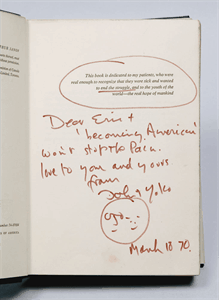
Lennon Primal Scream inscription, March 8, 1970: “‘Becoming American’ won’t stop the pain.” Would that John had taken his own advice.
In this reading, the breakup of the Beatles is tremendously sad. Everybody lost, John Lennon most of all — not because of all the great Beatle tunes he might have written, but because he impulsively laid waste to his creative life in the vain hope that doing so would bring him some elusive emotional peace. It did not, and when he realized that, I think he had a tremendous amount of shame, embarrassment and regret. That explains his vicious behavior towards Paul a lot better than the supposed secret digs of “Too Many People.”
Perhaps that is why Beatles, Inc., continues to pump out the conventional story: because the truth is much, much sadder. That such a splendid happenstance should dissolve into lawsuits and self-indulgence is bad enough. That it was a mistake, a miscalculation, something John Lennon longed to take back, but didn’t have the courage to do so (yet)…well, that is almost too sad to bear.

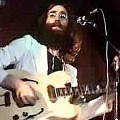
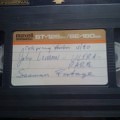
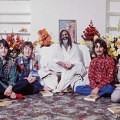
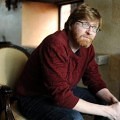
Wow. That’s a lot to think about. I think you’re right about it being easier, more comfortable to call it ‘inevitable’.
Well, I’ve got a whole novel about it, Elise! Hope there was some good sense among the blather.
It wasn’t nearly as disjointed as you led me to believe. 😉
I don’t know. This seems reasonable, but I’m still pretty new to this and every time I think I’ve got things settled in my mind, something else pops up and changes it completely. I guess I’ll never be bored as a Beatles fan.
But it is a good article, so don’t worry about that.
Yes, there are a lot of reasons people keep revisiting and puzzling over the breakup. It does feel sad and senseless, needlessly damaging to all four of the principles.
I think your point about Epstein and Lennon is well taken, though I’d add that the Lennon/McCartney axis was just as important, if not more so. But with Epstein gone, the necessary balance to that partnership was gone too.
I’d add that it’s harsh to characterize McCartney as “snuggling up” to his Beatle past. He was hugely damaged by the breakup, especially his sundered relationship with Lennon, and one way and another he’s been wrestling with the whole thing since. Paul’s reaction to John’s intended departure (the public statement, the self-interview included in “McCartney”) was part of what made the Beatles’ split irrevocable, as he has to know. If Paul’s now able to enjoy playing some of the Beatles’ songs live now, maybe he can finally lay (most of) that ghost, at least personally. Listening to Ringo and Paul sing “Walk With Me” from Ringo’s new album, I hear them both trying to make what peace they can with a part of the Beatles story they both regret.
The essay in Rolling Stone magazine last fall about the Beatles break-up, by Mikal Gilmore, makes a similar point to what you’ve said here. That article says the Lennon never really intended to break up the Beatles, that he wanted to rein Paul in and have the Beatles be more of a loose confederation. But the article says Lennon went too far. Here’s a good passage from the RS article:
“Harrison and Lennon were profound men who understood the necessity for hope and fellowship, and yet they were also men who could be profoundly petty and ungrateful. … Both men became uncharacteristically obsessed with financial eminence near the group’s end. … Both Lennon and Harrison (Lennon, clearly, in particular) did their best to sabotage the Beatles from mid-1968 onward, and when it all came irrevocably apart, I believe that both men regretted what they had wrought. I don’t think that John Lennon and George Harrison (but Lennon, again, in particular) truly meant the Beatles to end, even though they might not have known it in the moment. I think they meant to shift the balance of power, I think they meant for the Beatles to become, in a sense, a more casual form of collaboration, and I think they clearly intended to rein in Paul McCartney. But they overplayed their hand and — there’s no way around it — they treated McCartney shamefully during 1969, and unforgivably in the early months of 1970.”
My other thought: I agree that Lennon felt betrayed when McCartney sought extra shares in Northern Songs. However, look at it from Paul’s point of view: His long term partner is doing TONS of drugs and doing all kinds of crazy things with Yoko to get public attention. Paul’s worried about his music and about his future. So he tries to get more control. It’s sneaky. But if my partner was doing nutty things, and I couldn’t trust him anymore, I’d be worried about getting control, too. In that light, Paul’s actions are understandable.
I’m not sure I agree with you that Brian and John were running the show early on. I think it was Paul in there, too. Many, many books (including Geoff Emerick’s) say that John and Paul made all the decisions together; that John never made a decision without running it by Paul.
This comment has been removed by the author.
Glad it made some sense, Elise.
Nancy, I mentioned that Epstein/Lennon quote simply to underscore that we on the outside don’t really know how it all worked. Because on the other side you’ve got the standard line: “Stick to your percentages…” The one thing I think we can say is that it wasn’t like what we’ve been told, not out of people being intentionally misleading (though surely sometimes they have been) as much as the reality being complicated, regrets, ego, things shifting over time, and fading memories.
I wasn’t criticizing McCartney for how he’s treated his Beatle past. Out of the four I think he’s handled it most appropriately, continuing to strive, but acknowledging what they did. The Beatles WEREN’T just a band that made it really big, nor were they another expression of “maya.” So I think it’s completely appropriate for Macca to play Beatles tunes in concert; yes, it’s giving fans what they want, but they’re his tunes if they’re anybody’s.
I think that’s good, Anon, but what Gilmore doesn’t say–at least in what you clipped–is the role that Yoko Ono played in the breakup. I’m not one of those “Yoko did it” people (John did it, and was the only person who could do it) but having said that, it is patently obvious that Yoko was no friend to the group. If all she’d done was introduce John to heroin and then shuffled off to Buffalo, that alone might’ve been enough to cause the split. But of course she did much more; she saw the group (especially Paul) as a rival and a threat, and worked hard to gain “senior partner” status with her husband. Most people in her position would; you’d have to be a serious Beatles fan NOT to, and if there’s one thing we know about John Lennon, it’s that he didn’t want to marry a Beatles fan.
We mustn’t be too hard on Yoko; when one remembers the vast amounts of money, power, and influence that were at stake, it’s no wonder that nobody was acting as their best self. That having been said, Yoko’s presence and actions greatly increased the tension between the four of them–as well as increasing the all-or-nothing “going too far” that Gilmore talks about. That’s a consistent piece in everybody’s story, so I think it’s fair to say. Forty years later, with her husband dead and the world still nutty about The Beatles, Yoko may well feel differently about the group, I don’t know. People change, and I would not be surprised if Yoko “gets” The Beatles more now than she did in 1969.
As long as Jann Wenner’s running Rolling Stone, I won’t trust it entirely when it talks about John Lennon; it’s simply not objective, and in fact has never pretended to be. When Rolling Stone speaks, I assume it’s the estate talking–which doesn’t make it incorrect, I just take it with a grain of salt. The Wenner/Lennon relationship was complicated, too.
I think your read on McCartney’s Northern Songs machinations are correct. I think that McCartney honestly felt that what they had worked for was in danger of slipping away–and between Allan Klein, and Lennon’s actions, this was a very reasonable belief. That fear might have made him overreact sometimes (Northern, the Eastmans, the lawsuit), but I can’t judge him for that. In fact I can’t judge any of ’em for anything, because I wasn’t there and it wasn’t my life. I’m just trying to put it together in my mind, FWIW.
Wow, this has been a lot of information to take in today, and all I wanted was an excuse to post that superb photo of George! 😉
I’m still new to blogging but I must say that I have been more inspired, enlightened, and challenged by these posts than in almost 25 years of studying the beatles. It’s refreshing to have such intelligent debate with fellow beatleologists. I don’t care if our views differ but to have the subject matter treated with such respect is amazing.
I know i didn’t go into great detail in my own post, so some of my points might appear flippant (George playing with another band = George not wanting to be a beatle. I know there is so much more to that story, it was just a wee example. And I am actually not of the school that equates Paul to a machiavellian Mr Showbiz, I know there is SO much more to Paul, but i do feel that John, while having driven the beatles to superstardom together with Eppy and Paul, was cooling off on the idea of being a beatle by the time of 68/69 – whereas I think Paul could see a way to be a beatle and still feel inspired to perform his greatest work within the structure of the band).
The proposal here that John took things too far with perhaps an unintended notion of breaking up the band is new information to me, and kinda hard to reconcile to be honest. I am open-minded and like to consider arguments with due consideration so I’ll do some pondering over this one…
My gut feeling for the moment is still that the guys were essentially not happy anymore, each in their own way (I’m thinking of that very telling story of Ringo’s from Anthology where he went to each of them and said I feel out of it and you guys are so close, only to realise they all felt the same – talk about a classic sign of a relationship being in trouble, multiplied by 4!).
Simplistic interpretation i know. But just thinking of how things happen in real-life, relationships break-up, people grow up and grow apart (especially people who met as kids), partners who once inspired you can bore you or irritate you to distraction, new partners seem to offer the answer to everything and heaven too. It’s human nature, we’ve all been there. The Beatles lived the equivalent of ten lifetimes between 60-69, weren’t they just burnt out by 1970 and needing to not be beatles for a while (and i mean a long while)? Nancy said that the break-up feels sad and senseless. To me it makes a lot of sense, taking into account the incredible journey they went on in their careers and personal lives, I feel they were an implosion waiting to happen, and i’m just so incredibly grateful they lasted as long as they did, as they have changed my life! As I’m sure you all feel too 🙂
Two waivers I would like to make here, or three perhaps. This is completely all just my own opinion and I respect everyone else who has taken the time to post and comment; my comments, and a lot of my fellow posters, are speculation, as, unfortunately for us, we are neither messrs John, George, Ringo, nor Paul, so we can only surmise, even if intelligently and impassionately, what they were feeling or motivated by at that time; it’s all hypothetical because what did happen was that they officially broke up in April 70.
I have no idea what my point is anymore, lol. But i’ve got a lot of thinking to do so I’m going to stop writing now…
In the meantime, I want to hear more about Michael’s novel please! 🙂
shirley
from http://www.beatlestillidie.blogspot.com 🙂
xx
Shirley,
Totally agree that Paul probably would’ve been happy to be a Beatle unto death. Also agree that after Rishikesh Lennon was looking for “the next thing” after the group. So I don’t think it was out of character for Lennon to blow up The Beatles. My point (such as I have one) is that he paid a terrible price for this kind of all/nothing behavior in general and blowing up The Beatles in particular, and he was too smart not to learn this. Eventually, Lennon would’ve realized that his friendship with the others was more important than his pride. As much as he might have preferred it to be Yoko, the other three working-class guys from Liverpool were John Lennon’s “Rosebud,” and he knew it. As he continued to come off Mount Olympus, that would’ve gotten easier and easier.
Couple things that occurred to me whilst reading your comment:
a) I had a writing partner for 10 years; it is an incredibly intense relationship and you get all up in each other’s business. There’s a lot of emotion in it–affection, resentment, admiration, envy, fear, love–you name it. You literally DO “call each other every name in the book.” But you also develop working styles/coping mechanisms for all this. Lennon between 1968-70 seems like a guy feeling all the emotions of a complex, multi-partner creative partnership, but stripped of his coping mechanisms for some reason. That kind of exposure is embarrassing, and it takes a weird type of courage to go back into a partnership after the other guys have seen you at your worst. It’s harder still, I’m sure, if your wife is involved.
b) Keep in mind that George was meditating a lot, and the single biggest change I’ve noticed in my own self since meditating is an ability to hold two ideas in my head simultaneously, without judgment. That could explain the memo right there. “Here you guys, consider this.”
I’m still figuring out how best to bring this novel to market, Shirley, but it’s the story of a Lennon-like rock star who survives an assassination attempt and has to go incognito to find out who killed him and why. I’ll keep Dullblog posted. Just had a wonderful lunch with a big fan of the book out here in LA; she was in the music biz, had a little Beatle contact, and thought my book was “uncanny” in how it got to the heart of our favorite foursome. The story it tells is dark–rock and roll Raymond Chandler–but my feeling has always been that we fans can’t really appreciate what the Fabs gave us without understanding what they had to overcome to do so, and so my book has a lot of affection in it, going under the name of “trying to understand.”
I’ll let you know when it’s out, and in what form! Thanks for asking!
Well, all this is why I love this site. Long live Hey Dullblog!
Michael, I didn’t mean to come across as unduly critical of your post — I just think Paul has taken a lot of heat for doing Beatles songs live and has gotten called things like “Mr. Showbiz” a little too often. For sure he’s the most performance-happy ex-Beatle, but is that so bad?
Here’s another thought, prompted by your post and the responses to it: both John and Paul reacted to Brian Epstein’s death in ways predicted by their reactions to their respective mothers’ deaths. John learned from his whole childhood that he couldn’t really trust anyone (from his p.o.v., both his parents abandoned him), and that if you loved someone, he or she would vanish or change beyond recognition (his Uncle George, his mother, Stu Sutcliffe, and from his perspective, Cynthia). Paul learned from his childhood that when the worst happened (his mother’s death), you pulled together and worked harder.
So Brian Epstein dies, and John reacts by withdrawing his emotional investment from the Beatles, and in particular withdrawing from Paul. Paul reacts by getting more frenetic and anxious, trying to keep things moving and everyone together. John reacts to THAT by increasingly seeing Paul as a parental figure rather than a peer, someone who’s trying to take over a la his Aunt Mimi, and gets more resentful and less willing to cooperate. Paul reacts to this by getting angrier and less tolerant of John — here’s Paul doing all this work, trying to keep the band together, and John doesn’t appreciate it at all! –and the whole cycle continues until the group splits apart.
Of course all this is vastly complicated by money, Apple, Yoko, etc. etc., but it seems to me to be part of the story. Once Paul went from peer to parent, in John’s eyes, it was all over. The fact that Yoko became “Mother Superior” is another twist . . . .
They had become “family” and in doing so their sibling rivalry(as John once called it)became more than competitive, Paul once said of John in an interview I read that he was a “debunker”its seems such an innocuous word to use but he could be good with words could old Paul, John constantly dropped people, things, places, lives you name it in the pursuit of whatever he wanted to pursue, it made him exciting in someways because he couldnt be held down by anyone or anything, but in reality this is precisely what he craved. John also said once I think at least that when he didnt see the “others” as he would call them in mid sixties interviews(or one at least)he would forget who he was!not entirely unknown for most of us if weve been out of work for a while or dont see regular familiar face around too much but in Johns case it would appear to be more focued than that, his identity I believe was firmly routed in the persona hed secured as a member of a band/famiy and in doing so he must have felt hostage to that concept, without fully understanding how vital it was to his life. In my view his split from the group and his close friends caused him immeasurable problems later on, I even feel sympathy for Yoko because she must have struggled to keep him in check as the man she’d met all along,even if being that man had perhaps meant a ride to the top, he must have needed her to hold him together, a task that the beatles had done as successfully as anything had in his short life, we sometimes forget how much Yoko had to deal with in regards to John, but they had made their pact with one another and the destiny they both sought was I believe different to what we could have known. Paul must feel torn over the whole beatles story, the publics palatable version or the real truth of which the four of them only knew,he can never compete with the perception still out there that John the tormented genius was always the real deal, maybe in some ways he really was but his “medium” like qualities that he could orchestrate whilst the beatles created and performed, were also subject to having the right qualities in the band and in some magical way that is what the beatles had, its just the same for all of us, personal relationships are hard for us all to keep going, never mind if the whole world wanted it that way, he tried his best I believe but Johns deluded judgement had already been set alight and would burn for some years to come, however by 1980 it was just possible the tide would change for those two as it is we’ll never know for sure, its one of the saddest stories in modern cultural history I think, but in keeping with all great art theres a greatness in its tragedy that gives it all added authenticity and makes them all the more human for it.
They had become “family” and in doing so their sibling rivalry(as John once called it)became more than competitive, Paul once said of John in an interview I read that he was a “debunker”its seems such an innocuous word to use but he could be good with words could old Paul, John constantly dropped people, things, places, lives you name it in the pursuit of whatever he wanted to pursue, it made him exciting in someways because he couldnt be held down by anyone or anything, but in reality this is precisely what he craved. John also said once I think at least that when he didnt see the “others” as he would call them in mid sixties interviews(or one at least)he would forget who he was!not entirely unknown for most of us if weve been out of work for a while or dont see regular familiar face around too much but in Johns case it would appear to be more focued than that, his identity I believe was firmly routed in the persona hed secured as a member of a band/famiy and in doing so he must have felt hostage to that concept, without fully understanding how vital it was to his life. In my view his split from the group and his close friends caused him immeasurable problems later on, I even feel sympathy for Yoko because she must have struggled to keep him in check as the man she’d met all along,even if being that man had perhaps meant a ride to the top, he must have needed her to hold him together, a task that the beatles had done as successfully as anything had in his short life, we sometimes forget how much Yoko had to deal with in regards to John, but they had made their pact with one another and the destiny they both sought was I believe different to what we could have known. Paul must feel torn over the whole beatles story, the publics palatable version or the real truth of which the four of them only knew,he can never compete with the perception still out there that John the tormented genius was always the real deal, maybe in some ways he really was but his “medium” like qualities that he could orchestrate whilst the beatles created and performed, were also subject to having the right qualities in the band and in some magical way that is what the beatles had, its just the same for all of us, personal relationships are hard for us all to keep going, never mind if the whole world wanted it that way, he tried his best I believe but Johns deluded judgement had already been set alight and would burn for some years to come, however by 1980 it was just possible the tide would change for those two as it is we’ll never know for sure, its one of the saddest stories in modern cultural history I think, but in keeping with all great art theres a greatness in its tragedy that gives it all added authenticity and makes them all the more human for it.
They had become “family” and in doing so their sibling rivalry(as John once called it)became more than competitive, Paul once said of John in an interview I read that he was a “debunker”its seems such an innocuous word to use but he could be good with words could old Paul, John constantly dropped people, things, places, lives you name it in the pursuit of whatever he wanted to pursue, it made him exciting in someways because he couldnt be held down by anyone or anything, but in reality this is precisely what he craved. John also said once I think at least that when he didnt see the “others” as he would call them in mid sixties interviews(or one at least)he would forget who he was!not entirely unknown for most of us if weve been out of work for a while or dont see regular familiar face around too much but in Johns case it would appear to be more focued than that, his identity I believe was firmly routed in the persona hed secured as a member of a band/famiy and in doing so he must have felt hostage to that concept, without fully understanding how vital it was to his life. In my view his split from the group and his close friends caused him immeasurable problems later on, I even feel sympathy for Yoko because she must have struggled to keep him in check as the man she’d met all along,even if being that man had perhaps meant a ride to the top, he must have needed her to hold him together, a task that the beatles had done as successfully as anything had in his short life, we sometimes forget how much Yoko had to deal with in regards to John, but they had made their pact with one another and the destiny they both sought was I believe different to what we could have known. Paul must feel torn over the whole beatles story, the publics palatable version or the real truth of which the four of them only knew,he can never compete with the perception still out there that John the tormented genius was always the real deal, maybe in some ways he really was but his “medium” like qualities that he could orchestrate whilst the beatles created and performed, were also subject to having the right qualities in the band and in some magical way that is what the beatles had, its just the same for all of us, personal relationships are hard for us all to keep going, never mind if the whole world wanted it that way, he tried his best I believe but Johns deluded judgement had already been set alight and would burn for some years to come, however by 1980 it was just possible the tide would change for those two as it is we’ll never know for sure, its one of the saddest stories in modern cultural history I think, but in keeping with all great art theres a greatness in its tragedy that gives it all added authenticity and makes them all the more human for it.
Some great comments and perspectives being laid out here – and some are new to me (and I’ve been a Beatle-freak for over forty years, although I’d never profess to be an ‘expert’).
My tupennies worth… if I’m not mistaken – I seem to recall John saying in an interview in the mid-’70s that he didn’t rule out the possibility of a Beatles reunion taking place if the ‘circumstances were right’? I can’t recall who this interview was with – it’s on film (I seem to recall it taking place on the beach in the US – perhaps during his so-called ‘Lost Weekend’. That would certainly make sense as Yoko wasn’t around in person to weave her magick). And didn’t George in a David Wigg interview around the time of ‘Abbey Road'(?) dismiss the absolute certainty that The Beatles had split?… I apologise if I’ve got this wrong (it”s been a looong time since I last heard that interview). I seem to recall him saying that he, John, and Ringo could pursue solo projects but ‘report back’ every now and again for a new album of Beatles material? If all this is accurate, then the split was by no means a done and dusted decision – irrespective of John’s and George’s separate decisions to walk out.
[…] a secret history of The Beatles? In a private email, commenter Justin and I began talking about this Dullblog post—which, nearly ten years later, remains the best summary of my feelings on the breakup. (For those […]
[…] endlessly.) This podcast is worth listening to from the first bit with George, which emphasizes his curiously pro-Beatles outlook in 1969 and […]
There’s a typed Lennon letter currently for sale at Julien’s auctions. If you can get past the puns and wordplay, there’s an interesting passage towards the end – “…not to mention those selfindulgentlemen who split write before my eyes before we gave them permission impossible and even if they did get back to back again like we did last summer who’d want to know anyway…”
https://www.julienslive.com/lot-details/index/catalog/391/lot/166420?url=%2Fauctions%2Fcatalog%2Fid%2F391%3Fpage%3D1%26view%3Dlist%26catm%3Dany%26order%3Dorder_num%26xclosed%3Dno%26featured%3Dno%26key%3Dlennon